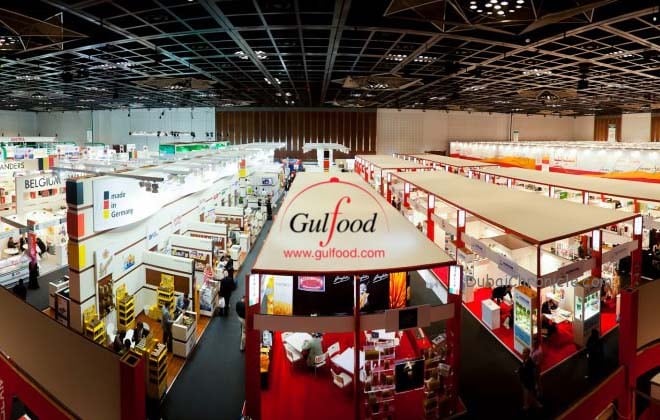
Highlighting the importance of Dubai as a key trading hub for the global food industry, country leaders, government ministers and top level delegations are scheduled to attend this week’s 19th edition of Gulfood, the world’s largest annual food and hospitality industry trade show.
Running from Sunday 23 until Thursday 27 February 2014 at the Dubai World Trade Centre (DWTC), Gulfood 2014 will host a record 4,500 exhibitors from 120 countries and welcome 10 new country pavilions. A key barometer for trade, trends and top-line market growth, Gulfood will introduce a number of innovative new features this year, including specialist B2B programmes, a dedicated halal food platform and a pioneering, high-ranking ministerial summit.
With more than 80,000 international trade visitors from over 150 countries expected to attend this year’s five day show, Gulfood remains an important enabler in servicing the region’s fast growing hospitality and tourism industries. According to the latest visitor number results released by Dubai’s Department of Tourism and Commerce Marketing (DTCM), 7.9 million people visited Dubai in the first nine months of 2013 – a 9.8 per cent increase year-on-year – driving increased occupancy levels in 84,000 hotel rooms across more than 610 accommodation properties.
In addition to project spending and services, trade and tourism are key growth drivers for the UAE economy in 2014. Beyond its position as the trade show with one of the highest volume trading platforms in the global food industry, Gulfood is a major contributor to Dubai’s growing reputation as a global events destination and a key pillar of Dubai’s 2020 tourism vision, which is set to double its annual visitors numbers from 10 million in 2012 to 20 million in 2020.
Speaking about the importance of Gulfood for the global food industry, as well its considerable contribution to Dubai’s economy, HE Helal AlMarri, CEO, DWTC and Director General, Department of Tourism & Commerce Marketing (DTCM), said: “The value that Gulfood provides to the food and beverage industry is undisputed and the show is now recognised as a world-class investment platform and business facilitator on a truly global scale. This year’s show sees the launch of our dedicated halal food platform, Halal World Food, as well as the inaugural World Food Security Summit, where government ministries, top level officials and international industry leaders will come together to discuss challenges in securing the region’s future food supplies. This innovative new content will further harness Gulfood’s capacity to drive Dubai’s leading role in steering the global food agenda.”
With heavy reliance on imports and limited availability of agricultural resources posing a challenge to the economy, the issue of food security remains critical region-wide. Gulfood conferences will address the latest trends, investment opportunities, growth drivers and challenges impacting various sectors of the global food industry through panel discussions, presentations, interactive workshops and case studies.
As part of its extended five-day format, Gulfood will host the inaugural World Food Security Summit – A Gulfood Leaders event, bringing together high-ranking ministers, industry thought leaders, government representatives and sector-specific visionaries to address the importance of securing a stable, cost-effective and safe supply of food for the world’s growing population.
More than 300 key stakeholders from across the international food industry value chain will address prevailing food security concerns, debate mechanisms to bridge the gap between supply and demand and explore strategies that encourage alliances and initiatives to tackle future challenges of the global food industry.
The Middle East and North Africa are important export markets for the Victorian State, which last year exported US$1.3 billion of food and beverage products to the region, including grains, meat, dairy product, almonds, and a mix of dried and fresh fruits.
While vegetables and dairy products dominate regional food production, GCC countries rely on imports to satisfy their meat and wheat requirements. In 2010, the GCC collectively imported 27.5 million tons of food, more than double the food that was produced locally. In addition to significant investment in foreign farmland, countries in the region are increasing focus on developing the food manufacturing sector. The UAE continues to strengthen its position as a major logistical hub for an increasing number of food products and is playing a major role in establishing food security in the GCC region.
With the rise in regional income levels and the growth of tourism in the region, increased halal food consumption is a key driver of global food industry growth. Halal World Food, a specialist show-within-a-show platform debuting at this year’s Gulfood, will welcome more than 450 of the world’s leading halal manufacturers, processors and distributors from over 50 countries and is expected to generate significant investment opportunities for major international businesses eyeing regional buyers, suppliers, logistics providers and storage and transport solutions.
Gulfood 2014, which is part of the 23-day Dubai Food Festival, is strictly a trade-only event and is open to business and trade visitors from within the industry only. The show is open 11am-7pm from February 23-26 and 11am-5pm on February 27. For more information, please visit www.gulfood.com.









![The Square at Nad Al Sheba Gardens Now Open hope tax season treated you well! Just checking in—ready to refocus on growing your business? I remember how we discussed scaling your [specific aspect of their business, e.g., online presence] but paused due to time constraints. We now offer a streamlined 6-month plan that delivers real results without adding to your workload. Let me know if you'd like to chat—I’d love to help you pick up where we left off!](https://www.dubaichronicle.com/wp-content/uploads/2024/11/The-Square-5-265x198.jpg)


